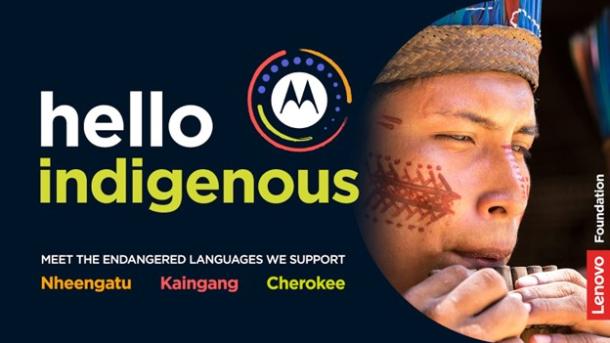This year, the United Nations General Assembly declared the period from 2022 to 2032 as the International Decade of Indigenous Languages (IDIL 2022-2032). It is an initiative to make the world's population aware of the critical situation of several of these languages and to mobilize people and resources for their preservation, revitalization and promotion.

Aware of our global company's role and mission to bring more innovative technology to everyone, Motorola has invested in raising awareness and putting into practice our ongoing commitment to the project to revitalize indigenous languages, which was first presented in early 2021. Today, as part of UNESCO's event celebrating the International Decade of Indigenous Languages, Motorola announced the new phase of the project focused on indigenous languages of India, which will take place in the coming months.Alongside the Lenovo Foundation, we are also proud to partner with UNESCO to conduct further research on the impact and potential of digitizing endangered indigenous languages
Sergio Buniac, President of Motorola and Vice President of Lenovo Foundation
Sergio Buniac, President of Motorola and Vice President of Lenovo, and representatives of the Lenovo Foundation and Motorola's Globalization Area participated in the event in Paris. It brought together High-level representatives of UNESCO Member States, indigenous leaders, the United Nations System agencies, national civil society research organizations, and representatives of the public and private sectors. The objective of the meeting in France was to discuss how to integrate and preserve indigenous languages worldwide and how it is possible to cooperate for a more inclusive future.
As new generations of indigenous peoples learn and use technology more, they must be able to use their native language in new digital formats so that the language does not disappear. UNESCO estimates that an indigenous language is lost every two weeks, resulting in the disappearance of around 3,000 unique languages by the end of the century.
To help preserve our human heritage and the stories of indigenous cultures and encourage future generations, Motorola is working with the Lenovo Foundation to integrate languages into its smartphones. The Kaingang languages, from the southern region of Brazil; Nheengatu, from the Amazon; and Cherokee, from the United States, are already part of the more than 80 languages that Motorola offers in the interface of its cell phones.
With this initiative, Motorola has become the first mobile phone manufacturer to give Cherokee citizens access to a fully localized user interface and to offer full compatibility with an indigenous language in the Amazon. In addition, Motorola has shared the characters, 360,000 translated words and language customizations with the Android platform so that other OEMs and companies can include these languages in their interfaces, paving the way for broader usage and revitalization. For starters, Lenovo, Motorola's parent company, intends to integrate languages into its computers.
As the project moves forward over the next decade, Motorola and the Lenovo Foundation hope to raise awareness, act for the survival of endangered languages, and encourage the next generations of indigenous communities to use the technology in their native languages.
Source: Motorola and Lenovo Foundation.
Disclaimer of Legal Liability
MOTOROLA, the Stylized M Logo, MOTO and the MOTO set of marks are Motorola Trademark Holdings, LLC trademarks. Android is a trademark of Google, LLC. All other trademarks belong to their respective owners. © 2022 Motorola Mobility LLC. All rights reserved.






